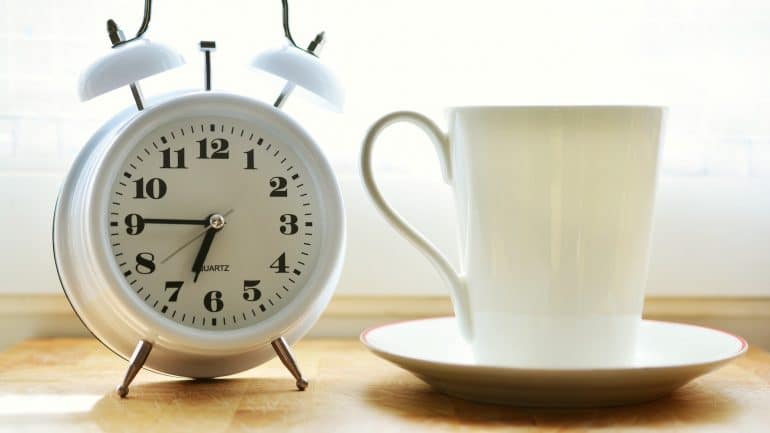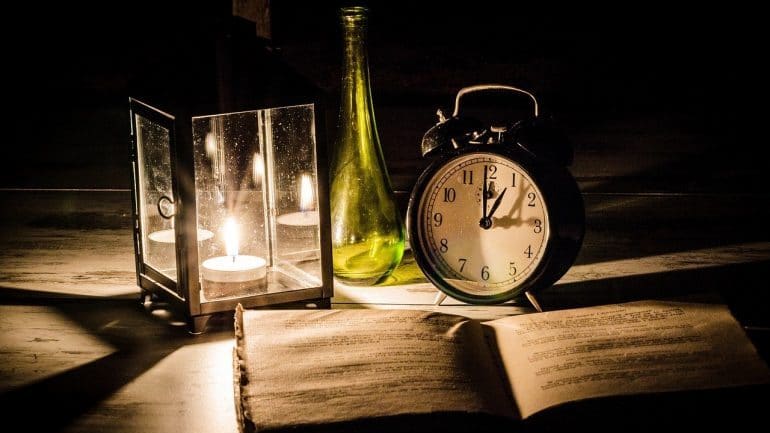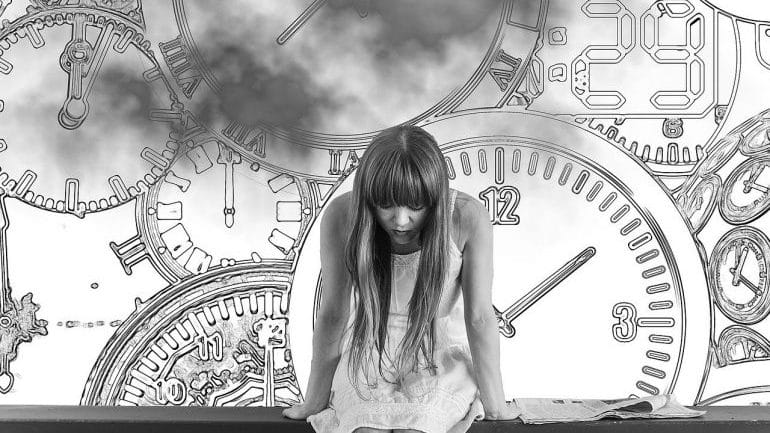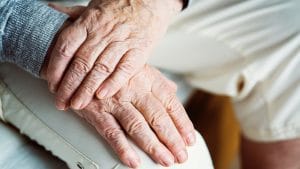What Is the Circadian Rhythm and How Does It Affect Sleep?
written by / December 23, 2019

Have you ever noticed that you feel amazing in the evenings, but lack energy in the mornings? Have you ever wondered about the scientific explanation for the difference between night owls and early birds? Well then, perhaps you should first be asking, what is the circadian rhythm?
Understanding this part of our biology, both in practicality and in the scientific sense, can help us get more control over our lives—and our health. We can quickly define the circadian rhythm as a biological cycle that lasts for 24 hours every day. Within the 24-hour cycle, this rhythm influences our hormones, eating habits, and body temperatures, not to mention our sleep-wake cycles.
Know that the circadian rhythm is present in plants, animals, and fungi—not just humans. It’s absolutely central to our daily lives, our habits, and our health. In fact, the 2017 Nobel Prize in Physiology or Medicine was awarded to Jeffrey C. Hall, Michael Rosbash, and Michael W. Young for their research and discoveries pertaining to these biological cycles.
Below, you can find more information on the circadian rhythm, its scientific basis, and how it influences our lives and habits.
What Is the Difference Between One’s Circadian Rhythm and Biological Clock?
Before continuing, you need to understand the difference between the circadian rhythm and our biological clock. Namely, the circadian rhythm, or rather rhythms, can also be defined another way: they are the physical, mental, and behavioral changes a person experiences within a 24-hour cycle.
Meanwhile, our biological clock is something similar, but still a little different because it’s a more inclusive term. Namely, a good definition of this process follows the fact that this is our innate timing device. Our biological clock actually leads to the occurrence of the circadian rhythm (as well as other biological rhythms) within the body.
How Does the Circadian Rhythm Work?
A simple answer is that the hypothalamus, by definition, is in charge of the circadian rhythm. But to give a little more detail, the circadian rhythm is controlled by a cluster of nerves found within the hypothalamus, known as the suprachiasmatic nucleus (the SCN). This cluster of nerves basically makes up the biological clock we mentioned earlier. Now that you know what regulates circadian rhythms, how does all this actually work?
The purpose of the SCN is to respond to varied environmental cues (for example, they’re the reason we feel tired once night falls). Some of these cues (also known as zeitgebers) are light levels, our eating habits, and our physical activity levels at certain points in time.
Once we experience some of these cues, they trigger the appropriate reactions within our bodies—things like our metabolism, sleep, mood, and body temperature, as well as our melatonin secretion. And it’s this melatonin secretion that leads to the common connection between circadian rhythms and sleep.
Namely, melatonin is known as the “sleep hormone.” Produced by the pineal gland, it’s activated by one of the aforementioned environmental cues, most often when our retina detects lower light levels (i.e., darkness falling outside). Melatonin then prepares our bodies for sleep.
Comprehensive research has shown that melatonin is vital for sleep, and many people take it in supplement form in order to improve their sleep quality. It also regulates blood pressure, our cortisol levels and immune functions, and also our body’s antioxidant defenses.
A healthy circadian rhythm will lead to the production of melatonin several hours before one goes to bed and will peak somewhere around five hours after falling asleep.
What Are Examples of Circadian Rhythms?

This is a common question that hinges more on semantics than it does on actual biology. Namely, on one level, you can understand that some examples include things like our sleep-wake cycles, hormone secretion cycles, and body-temperature cycles. However, these can also be seen as actions and processes within the body that are in fact merely governed by the circadian rhythm.
Why Is the Circadian Rhythm Important?
Your circadian rhythm isn’t just about you getting a good night’s sleep. Rather, it has a substantial impact on your health and overall wellbeing. For example, a study that included over 8000 employees showed interesting results. Of these participants, some worked standard “nine-to-five” jobs, while others had shift-based employment. The shift employees tended to get sick more, often suffering from a range of infectious diseases.
The human circadian rhythm influences our hormones and metabolism. It can also help us regulate blood sugar levels. Namely, our insulin levels are higher during the day than they are at night—and turning this on its head can mess up our blood sugar regulation. When these processes are functioning properly, you’ll have more energy during the day, as well. After all, your body clock dictates when the mitochondria, the powerhouse of the cell, will release energy. Throwing this off-balance leads to disrupted sleep and low energy levels during the day.
In fact, disrupting our natural circadian rhythm by not sticking to a regular sleep schedule leads to cardiovascular health problems, an increase in weight gain, insomnia, mood changes, and so on. Nearly any issue that comes with disrupted hormones and a messed-up metabolism will be linked to a disrupted circadian rhythm.
What Is a Normal Circadian Rhythm?
No circadian rhythm is strictly set in stone. While there are of course certain fixed points—like the fact that the circadian rhythm is greatly influenced by light—people’s rhythms generally vary.
A study published in Sports Medicine shows that there are distinct differences in cognition for people based on the time of day. People defined as night owls have a tough time waking up in the mornings and have more energy later in the day. However, it seems that the internal clock works differently for early birds, who are full of pep earlier in the day.
The reasoning behind these distinctions can be found in the actual name “circadian.” Namely, it comes from circa, meaning “around,” and diem, meaning “day.” This “around” part is vital. First, it refers to the fact that these rhythms do, indeed, revolve around a single day. However, “around” can also mean approximately. The circadian rhythm in humans isn’t completely fixed to 24 hours—different rhythms can be a bit late or early. So you can expect that early birds have a faster rhythm, while night owls have a slower rhythm.
Essentially, the notion that there’s such a thing as a standard circadian rhythm isn’t completely true (but also not completely false). While the sleep schedule most appropriate for you revolves around you going to bed when night falls and rising when the sun does, there’s also a chance that, based on your chronotype, doing precisely this can actually be harmful.
What Are the 4 Types of Biological Rhythms?
Now, there are several biological rhythms that govern certain processes in our bodies, all centered on a specific period of time. These four biological rhythms represent the natural cycle in which our body’s chemicals or functions change with time:
- The circadian rhythm
- The diurnal rhythm
- The ultradian rhythm
- The infradian rhythm
Our body’s internal clock (the SCN) regulates all of these.
Now, the diurnal rhythm is essentially the circadian rhythm when it’s synced with the passing of day or night. Quite often this is equated with the circadian rhythm, but there are some differences. Namely, the latter also includes physiological rhythms like sleeping, for example. Furthermore, the diurnal rhythm is specifically tied to night and day, governed by the diurnal clock, while the circadian rhythm by definition includes the behaviors found within a 24-hour cycle.
Ultradian rhythms are rhythms that include much shorter periods of time. The periods are defined as lasting longer than one hour, but shorter than a day. However, these rhythms also include blood circulation, growth hormone secretion, arousal, and bowel activity. Infradian rhythms, however, are much longer. They include things like menstruation, for example, or seasonal rhythms.
How to Figure out Your Own Natural Circadian Rhythm
This unfortunately shines a light on some less-than-fair aspects of our society. Namely, if you’re asking what is your circadian rhythm, you need to experiment and go against the grain. For some people, the nine-to-five grind is perfect, since their rhythms are ok with getting up early in the mornings.
However, if you’re a night owl, you won’t enjoy this option at all. Getting up early will be unpleasant, and you won’t really have enough energy in the mornings to accomplish what you need to. Put simply, your internal body clock dictates that you’ll be much more productive later in the day.
However, all this in a sense helps you figure out what’s natural for your body. First, you need to set a schedule, and then stick to it strictly. You go to bed at a set time and get up at a set time—no exceptions. After a couple of weeks, you’ll understand whether the fatigue you feel in the mornings is truly due to your circadian rhythm not being in line with other people’s, or if you simply had bad sleep hygiene and habits (more on that below).
What Is a Circadian Rhythm Sleep Disorder?
There isn’t only one specific sleep disorder related to the circadian rhythm. Rather, there are several that fall within the same family. Now, a simple definition of this type of sleep disorder is that it affects the timing of sleep. People will have difficulty sleeping and waking at the times traditionally necessary for school, social engagements, and work, causing a great deal of stress and anguish.
A circadian rhythm disorder can be intrinsic or extrinsic. The former is caused by certain misalignments and issues within the body and our internal clocks. The latter occurs due to external events.
Intrinsic Disorders
Delayed Sleep Phase Syndrome
DSPS is represented by people who have their sleep-wake times greatly delayed in comparison to people functioning normally. As a result, they have trouble waking up at what one would consider a regular time.
Advanced Sleep Phase Disorder
ASPD is the opposite of the previous type of circadian rhythm sleep disorder. Here, people fall asleep sooner and wake up much earlier than what’s considered typical.
Irregular Sleep-Wake Rhythm Disorder
Irregular sleep-wake rhythm disorder (ISWRD) falls within a standard 24-hour cycle. However, people with this disorder have very irregular sleep patterns. They wake up often during the night, they have disorganized bouts of sleep, and they often must nap during the day.
Non-24-Hour Sleep-Wake Disorder
Finally, non-24-hour sleep-wake disorder (N24) mostly targets people who are blind, because they can’t detect light. People suffering from this disorder have a delay in their sleep-wake cycles, and this can often become more serious and turn into DSPS.
Extrinsic Disorders
Jet Lag
Now, if your internal sleep clock is disrupted because of external events and obligations (most often these are associated with work), you can end up with extrinsic disorders like jet lag or shift work sleep disorder. Jet lag occurs when we have a misalignment between our internal circadian rhythm and the external world. Caused by switching between too many time zones too rapidly, our internal clock isn’t immediately able to adjust to the new environmental cues.
Shift Work Sleep Disorder
Shift work sleep disorder (SWSD) is also caused by a misalignment between our internal clocks and the environment. It primarily happens to people who work at night or who switch up their work schedule often.
What Can Disrupt Our Circadian Rhythm?

Now we have a better answer to the question, What is the circadian rhythm? But what can disrupt its normal processes? While we’ve mentioned the most common intrinsic and extrinsic disorders tied to the circadian rhythm. However, there are other factors that can cause problems, like the following:
- Daylight savings time
- Pregnancy
- Medication (or changing medications)
- Mental health
- Sudden changes in our routine
- Menopause
- Certain medical problems, like Alzheimer’s
Some of these lead to intrinsic changes, while others are like jet lag, essentially environmental and extrinsic.
How Do I Control My Circadian Rhythm?
First and foremost, to maintain a healthy circadian rhythm, you’ll need to make certain lifestyle changes and stick to good sleep habits. However, controlling your circadian rhythm, changing it in a way that’s beneficial (i.e., without severe medication or an illness) is impossible. Rather, you can only revert back to your regular pattern, or actually develop what’s most natural to you.
Now, these methods fall into two categories. First, you need to figure out what your natural circadian rhythm is (see above). Next, you’ll need to implement the best sleep hygiene and habits. So, as far as developing good habits is concerned, if you want to set your internal alarm clock to its most natural state, stick to the following:
- Don’t take any naps. No matter how tired you feel, naps will mess with your good night’s rest. You want to “save” some of that sleepiness for later.
- Don’t eat too close to bedtime. Eating before bed—especially spicy, salty, or greasy foods—will cause heartburn, and it will send the wrong signal to your body, since you’re giving it fuel to move when you actually want to rest.
- Avoid stimulants. When resetting your internal clock, you should avoid nicotine, coffee, or energy drinks, basically anything that gives you energy. You should minimize these in general, but especially within the six hours before you go to bed. Caffeine’s effects dissipate after just an hour or two, but it still has a half-life of six hours.
- No exercise directly before bed. The last thing you want is to pump yourself up, letting adrenaline course through your body right before bedtime.
- Avoid electronic lights before bed. If you’re looking for the best way how to reset your circadian rhythm, you shouldn’t interact with any circadian rhythm cues, the most important one being light. A gadget’s screen, no matter if it’s your laptop or your phone, will trick your body into thinking it’s still daytime. Sleep and electronics do not mix.
- Be patient. These lifestyle changes won’t offer immediate results, but after a time, you’ll definitely see an improvement. Consistency is key.
Do Circadian Rhythms Change with Age?
Yes, they do. Namely, our bodies are continually changing, and our circadian rhythm will of course follow suit. Many older people have issues both falling asleep and staying awake. As time goes on, our internal rhythm loses consistency. For example, circadian clocks in seniors are a bit faster. They wake up early in the mornings and feel fatigued earlier in the evenings. They also tend to feel a decline in cognitive functions once evening comes.
Conclusion
The circadian rhythm is a part of life, of nearly all living things, and understanding it better than you did yesterday can prove useful. We hope this article has thoroughly answered the question, What is the circadian rhythm? Understanding why it’s so important, what its underlying mechanisms are, and what we can do to make it fit our lives will have a major impact on our physical and mental health.
Remember, your circadian rhythm isn’t just about getting enough sleep. Rather, it regulates your metabolism and immune system, and it’s vital for your health and overall wellbeing. So try to stick to a regular sleep schedule. But now that you have an answer to just what is the circadian rhythm, you also know that other healthy lifestyle habits are important too.
Keep an eye on when you have your meals and avoid caffeine, stimulants, and electronics before bed. Try to get some exercise during the week and get as much sunlight as possible, and you should slowly but surely fall in line with the natural rhythm of your body.
Table of Contents
What Is the Difference Between One’s Circadian Rhythm and Biological Clock?
How Does the Circadian Rhythm Work?
What Are Examples of Circadian Rhythms?
Why Is the Circadian Rhythm Important?
What Is a Normal Circadian Rhythm?
What Are the 4 Types of Biological Rhythms?
How to Figure out Your Own Natural Circadian Rhythm
What Is a Circadian Rhythm Sleep Disorder?
What Can Disrupt Our Circadian Rhythm?
How Do I Control My Circadian Rhythm?
Do Circadian Rhythms Change with Age?
Conclusion
Table of Contents
What Is the Difference Between One’s Circadian Rhythm and Biological Clock?
How Does the Circadian Rhythm Work?
What Are Examples of Circadian Rhythms?
Why Is the Circadian Rhythm Important?
What Is a Normal Circadian Rhythm?
What Are the 4 Types of Biological Rhythms?
How to Figure out Your Own Natural Circadian Rhythm
What Is a Circadian Rhythm Sleep Disorder?
What Can Disrupt Our Circadian Rhythm?
How Do I Control My Circadian Rhythm?
Do Circadian Rhythms Change with Age?
Conclusion









Warning: Undefined array key "format" in /home/602518.cloudwaysapps.com/cspedpjass/public_html/wp-content/themes/disturbmenot/template-parts/post-item/post-comment.php on line 23
Warning: Undefined variable $commenter in /home/602518.cloudwaysapps.com/cspedpjass/public_html/wp-content/themes/disturbmenot/template-parts/post-item/post-comment.php on line 27
Warning: Trying to access array offset on value of type null in /home/602518.cloudwaysapps.com/cspedpjass/public_html/wp-content/themes/disturbmenot/template-parts/post-item/post-comment.php on line 27
Warning: Undefined variable $commenter in /home/602518.cloudwaysapps.com/cspedpjass/public_html/wp-content/themes/disturbmenot/template-parts/post-item/post-comment.php on line 29
Warning: Trying to access array offset on value of type null in /home/602518.cloudwaysapps.com/cspedpjass/public_html/wp-content/themes/disturbmenot/template-parts/post-item/post-comment.php on line 29